 Petzlover
PetzloverCatahoula Cur is originated from United States but Moscow Water Dog is originated from Russia. Both Catahoula Cur and Moscow Water Dog are having almost same height. Catahoula Cur may weigh 7 kg / 15 pounds lesser than Moscow Water Dog. Both Catahoula Cur and Moscow Water Dog has almost same life span. Both Catahoula Cur and Moscow Water Dog has same litter size. Catahoula Cur requires Low Maintenance. But Moscow Water Dog requires Moderate Maintenance
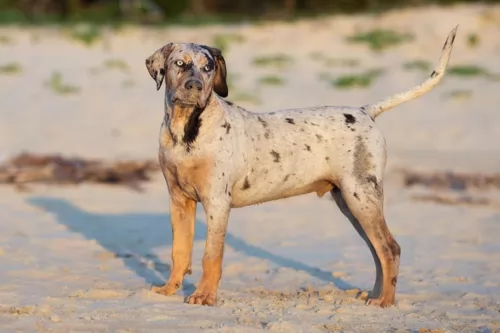 The Catahoula Cur is also known as the Catahoula Leopard Dog or the Louisiana Catahoula. The dog hails from Louisiana, United States.
The Catahoula Cur is also known as the Catahoula Leopard Dog or the Louisiana Catahoula. The dog hails from Louisiana, United States.
It is thought that the Catahoula Cur or Catahoula Hound as it is also known, used to be a hunting dog. The first settlers in Louisiana needed a strong dog to help them with hunting wild hogs and they bred their dogs with other dogs belonging to the locals. This gave them a strong, resilient dog that could take on the wild hogs and also protect their livestock.
Dogs who have no doubt been brought into the mix to produce the Catahoula Cur are mastiffs, Beaucerons, sighthounds and wolves.They are today more commonly referred to as Catahoula Leopard Dogs.
The Moscow Water Dog was developed in the Soviet Union around the same time as other classic Soviet dogs. The Moscow Watchdog and the Black Russian Terrier are a couple of these other dogs. The Water Dog came from crossing the Caucasian Oytcharka with the Newfoundland. The breed is known by many names including the Vodolaz which means “diver of deep Water”. The Moscow Water Dog was only bred in the Russian state’s Red Star Kennels as working dogs for the military.
Following the second World War, most of the working dogs had been destroyed during the war. Not enough dogs could be imported to begin a breeding program for any working breed. So, the Soviet Red Star Kennels began to create several working breeds. Included in this group with the Moscow Water Dog, were the Moscow Newfoundland, the Moscow Great Dane, the Black Russian Terrier, and the Brudasty Hound.
The only really successful breed coming from this program is the Russian Black Terrier. All the rest are either extinct or found only in Russia today. The Moscow Water Dog was supposed to be a life saver/water rescue dog, but the dogs they developed were too aggressive, and the program was scrapped. It seemed that the cross had bred a dog that had too much of the working water dog traits and not enough of the rescue dog traits. The military breeders tried to pass the dogs off as a Russian Newfoundland and sell it to the non-military.
These non-military owners of the few “Russian Newfoundland”, did not try to change the dogs through breeding. Instead over time they bred the Russian Newfoundland with pure bred Newfoundlands almost eliminating the “Russian” portion of the breed. By the early 1980’s the stock had been so diluted with the pure Newfoundland that the Russian Newfoundland was basically extinct.
The Red Army kennel had other breeds with some of the genes of this breed in their lines. This included the Brudasty Hound, the Moscow Great Dane, the Caucasian Oycharka, the Moscow Watchdog and the Russian Black Terrier. The Russian Navy was unhappy with the situation and never again let the army developed the Navy’s waterdog.
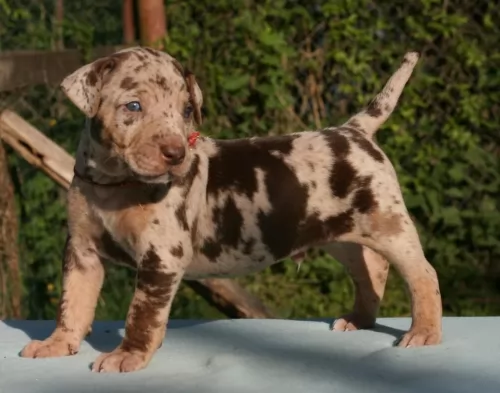 There are varying sizes for Catahoulas and a typical height is 51–66cm and weighing anything from 18 – 51kg. These Cathoula Cur’s come in different colors too, but the leopard-like coat is a dominant feature with this dog.
There are varying sizes for Catahoulas and a typical height is 51–66cm and weighing anything from 18 – 51kg. These Cathoula Cur’s come in different colors too, but the leopard-like coat is a dominant feature with this dog.
While there are solid colors, you can expect red- and blue merle, grey-, black, patchwork and brindle too.
The length of the coat varies somewhat too and while the coat is essentially short and smooth, there are Catahoulas where the coat is a little longer and more coarse.
The eyes of the Catahoula Cur are another interesting feature and both eyes can be the same color, but in some instances the one eye can be brown while the other could be blue, green or gray. The ears of the Catahoula Cur are medium in size and are floppy, dropping down close to the head.
The Catahoula Cur is an intelligent dog and also active and full of sports. You can’t call this dog aggressive, but merely assertive, being strong-willed. He is also affectionate and loyal, loving to spend time with his human family.
He makes a wonderful family pet, complete with children as well as other pets in the home, more so when he has been trained and socialized. These dogs are bright and alert and they also make excellent watch dogs. People who have owned a Catahoula Cur will tell you that these are wonderful pets, full of life and personality.
The Moscow Water Dog was intelligent, vigilant, an excellent swimmer, and great in artic waters. However, he was too aggressive and instead of saving the swimmer, they would attack them. The Moscow Water Dog is a tall, balanced and powerful dog. They have a wide muzzle and a square head like the Newfoundland. Their eyes are dark and small while the ears are triangular. The nose and lips are black. He has webbed feet of course and a hanging tail.
The coat on the Moscow Water Dog was of course waterproof and double. The top coat is very dense, straight and soft. It is usually a dark brown with some black and white.
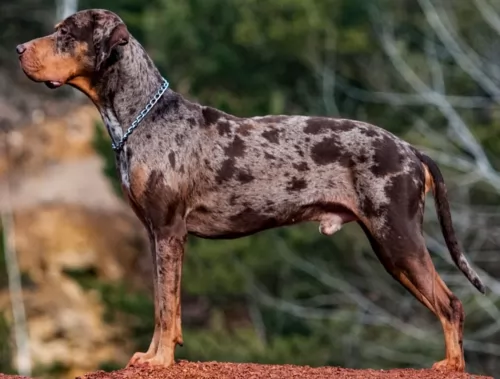 Catahoula dogs are the kind of dogs that make perfect family pets as they are all rounders. They’ve got characteristics that everybody wants in a dog. They are naturally protective, even they are not described as aggressive dogs. With training and socialization they get on well with children as well as other pets in the home. He is alert and territorial, which makes him a good watchdog, more so because he doesn’t particularly like strangers.
Catahoula dogs are the kind of dogs that make perfect family pets as they are all rounders. They’ve got characteristics that everybody wants in a dog. They are naturally protective, even they are not described as aggressive dogs. With training and socialization they get on well with children as well as other pets in the home. He is alert and territorial, which makes him a good watchdog, more so because he doesn’t particularly like strangers.
Intelligent and independent, training makes him wonderfully obedient and relaxed. However, give him the chance for ball games and a walk, and he is more than ready.
He is used to being a guard- and hunting dog, and this makes him an active, energetic dog. You will need to give him plenty of activities if you don’t want this amicable dog becoming anxious, frustrated and destructive.
Exercise him well, provide him with nourishing, top quality food together with fresh water and shower him with the love and attention he deserves as a family member. You’ll also join the ranks of Catahoula Cur owners who want to tell others about what an awesome pet he makes.
yes
Swimming and stamina
Yes but needed some land. Better in countryside.
This is an intelligent dog, but he could not be trained out of his aggressiveness.
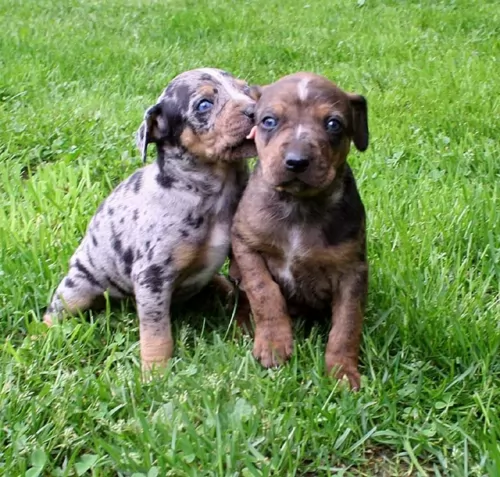 When you buy a Catahoula Cur, you can know that your pet is going to be fairly healthy, however there will be some common health issues to look out for, and by knowing about these health concerns, you can be better prepared.
When you buy a Catahoula Cur, you can know that your pet is going to be fairly healthy, however there will be some common health issues to look out for, and by knowing about these health concerns, you can be better prepared.
Your Catahoula Cur will be susceptible to some bacterial and viral infections which can be life threatening for him if he gets them. Some of these are parvo, distemper and rabies. That is why it is important to have your pet vaccinated, which can start at about 8 weeks of age for a puppy.
Obesity is a world-wide problem with humans and with their pets and it can open up a whole lot of problems with your pet’s health that he otherwise might not have got. It can play havoc with your pet’s digestion, and it can cause joint problems too.
It can be so tempting to pop a sweet treat into your pet’s mouth because you love him so much, but get to know what foods can actually be hazardous for him.
Because the breed was around for such a short period there is not a lot of documentation or information regarding genetic or propensity health issues. There are however a few issues that just his heritage and Newfoundland blood would lend itself to.
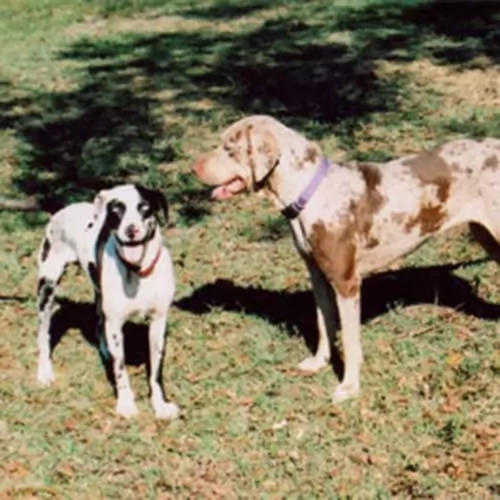 Your Catahoula Cur isn’t a high maintenance dog and a good brushing 2 times a week will keep his leopard coat looking shiny and free of loose hairs.
Your Catahoula Cur isn’t a high maintenance dog and a good brushing 2 times a week will keep his leopard coat looking shiny and free of loose hairs.
Catahoula’s have good teeth, and you want to keep them that way by brushing them at least 2 or 3 times a week to prevent dental decay and a host of other medical issues.
Required high quality food made specifically for large or giant puppies. Feed 3-4 times a day a total of 21/2 -3 cups.
Required high quality food made for large or giant dog breeds. Feed twice a day a total of 2 cups.
The Moscow Water Dog did not need a high level of exercise, but they did have a lot of stamina. They loved to swim. Not overly active – more of a couch potato.